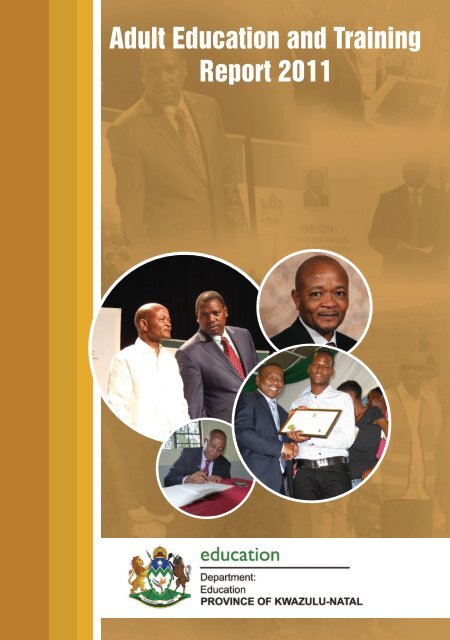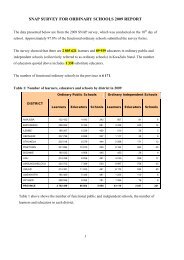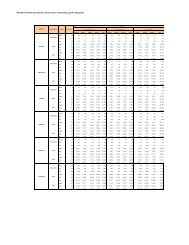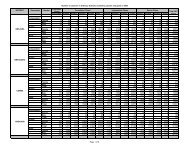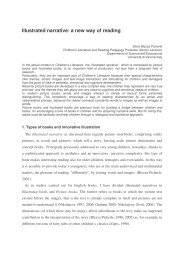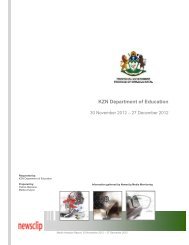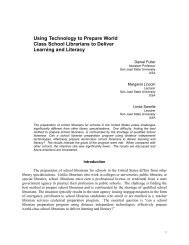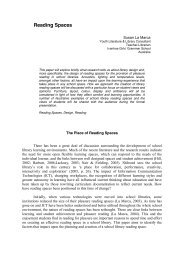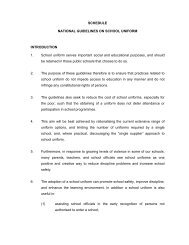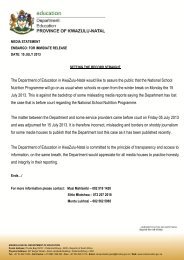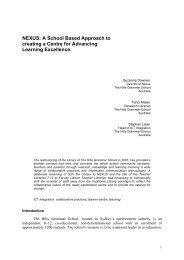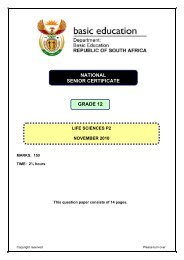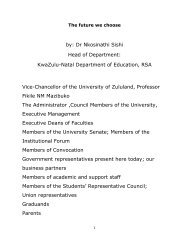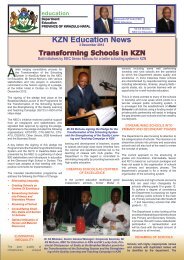Adult Education and Training - KwaZulu-Natal Department of ...
Adult Education and Training - KwaZulu-Natal Department of ...
Adult Education and Training - KwaZulu-Natal Department of ...
You also want an ePaper? Increase the reach of your titles
YUMPU automatically turns print PDFs into web optimized ePapers that Google loves.
<strong>Adult</strong> <strong>Education</strong> <strong>and</strong> <strong>Training</strong><br />
Report 2011
His Excellency J.G Zuma<br />
President <strong>of</strong> Republic <strong>of</strong> South Africa<br />
<strong>Adult</strong> <strong>Education</strong> <strong>and</strong> <strong>Training</strong> policies must not only open the doors <strong>of</strong> learning,<br />
but also provide adult learners <strong>and</strong> their families the opportunity to access the<br />
means to life.<br />
His Excellency Dr Zweli Mkhize<br />
<strong>KwaZulu</strong>-<strong>Natal</strong> Premier<br />
“We need to broaden access to education for all the citizens <strong>of</strong> this Province<br />
including adult learners in our <strong>Adult</strong> <strong>Education</strong> <strong>and</strong> <strong>Training</strong> sector”.<br />
02
03 04
CONTENTS<br />
Vision ...................................................................................................................... 5<br />
Mission .................................................................................................................... 5<br />
Strategic Goals <strong>and</strong> Objectives ................................................................................ 5<br />
Values ...................................................................................................................... 7<br />
Foreword by Member <strong>of</strong> the Executive Council ...................................................... 8<br />
Overview by Head <strong>of</strong> <strong>Department</strong> .......................................................................... 10<br />
Acronyms ................................................................................................................ 12<br />
1. Introduction ....................................................................................................... 14<br />
2. Philosophical Background .................................................................................. 15<br />
3. <strong>Adult</strong> <strong>Education</strong> <strong>and</strong> <strong>Training</strong> ............................................................................. 16<br />
4. The Public <strong>Adult</strong> Learning Centres ..................................................................... 18<br />
5.<br />
Challenges/Assessment ...................................................................................... 23<br />
6. <strong>Adult</strong> <strong>Education</strong> <strong>and</strong> <strong>Training</strong> Registration ......................................................... 26<br />
7. Marking ............................................................................................................. 28<br />
8. Conclusion ......................................................................................................... 33<br />
9. Annexures ............................................................................................................34<br />
04
A. Vision<br />
A well-educated, skilled <strong>and</strong> highly developed citizenry<br />
B. Mission<br />
To provide equitable access to quality education for the people <strong>of</strong> <strong>KwaZulu</strong>-<strong>Natal</strong><br />
C. Strategic Goals And Objectives<br />
The strategic goals are an instrument focusing the <strong>Department</strong> on achieving the vision using the mission<br />
as a vehicle. The articulation <strong>of</strong> the goals contributes to a concerted effort in ensuring that goals achieve<br />
the vision which in turn achieves the Provincial, National <strong>and</strong> International m<strong>and</strong>ate <strong>of</strong> the education<br />
sector. The strategic goals <strong>of</strong> the <strong>Department</strong> are:<br />
To provide diverse curricula <strong>and</strong> skills orientated programmes across the<br />
system.<br />
05 04
06 04
D. VALUES<br />
The <strong>KwaZulu</strong>-<strong>Natal</strong> <strong>Department</strong> <strong>of</strong> <strong>Education</strong> subscribes to the following values:<br />
Honesty<br />
Displaying honesty in service, as well as intolerance to fraud, corruption, nepotism <strong>and</strong> maladministration<br />
Caring<br />
Discharging our duties with kindness <strong>and</strong> generosity, <strong>and</strong> being mindful <strong>of</strong> the circumstances <strong>of</strong> others<br />
people, their needs <strong>and</strong> special requirements<br />
Empathy<br />
Sharing one another's emotions <strong>and</strong> feelings<br />
Pr<strong>of</strong>essionalism<br />
Demonstrating the highest st<strong>and</strong>ard <strong>and</strong> exceptional conduct <strong>of</strong> our pr<strong>of</strong>ession<br />
Integrity<br />
Ensuring consistency <strong>of</strong> actions <strong>and</strong> conduct with the highest ethical <strong>and</strong> moral st<strong>and</strong>ards<br />
Fairness<br />
Treating all people in a manner that is fair <strong>and</strong> just<br />
Excellence<br />
Maintaining high st<strong>and</strong>ards <strong>of</strong> performance <strong>and</strong> pr<strong>of</strong>essionalism by aiming for excellence in everything we<br />
do<br />
Teamwork<br />
Establishing <strong>and</strong> maintaining shared goals, <strong>and</strong> working together towards improving service delivery<br />
07
FOREWORD BY THE MEMBER OF THE EXECUTIVE COUNCIL ( MEC)<br />
Honourable E.S. Mchunu, MPL<br />
MEC: <strong>Education</strong><br />
The academic year 2011 has come <strong>and</strong> gone <strong>and</strong> the question that still lingers in our minds is whether learners<br />
who exit the <strong>Adult</strong> <strong>Education</strong> <strong>and</strong> <strong>Training</strong> programme will be absorbed in the labour market <strong>and</strong> will better<br />
cope with the rigours <strong>of</strong> Higher <strong>Education</strong> Institutions. It is an important fact to be made that in spite <strong>of</strong> the<br />
successful academic year, the education system remains saddled with unacceptable levels <strong>of</strong> illiteracy <strong>and</strong> the<br />
unevenness <strong>of</strong> the inherited legacy.<br />
In spite <strong>of</strong> all the challenges in the education system, we have demonstrated our determination to eradicate<br />
illiteracy in the Province through the integration <strong>of</strong> Masifundisane <strong>Adult</strong> Literacy Campaign into AET.<br />
The approval <strong>of</strong> 2012 tuition calendar which stretches from January to December (instead <strong>of</strong> February to<br />
November as has been the case in the previous years) benefits both learners <strong>and</strong> educators as it allows for<br />
more tuition hours. This is aimed at improving the current pass rate. The <strong>Department</strong> <strong>of</strong> <strong>Education</strong> has<br />
shown its determination to improve the working conditions <strong>of</strong> all practitioners in <strong>Adult</strong> <strong>Education</strong> <strong>and</strong><br />
<strong>Training</strong> sector.<br />
The sector still experiences challenges in the areas <strong>of</strong> infrastructure, high staff turnover, unqualified <strong>and</strong><br />
under-qualified educators. The department having noted these challenges has developed plans to<br />
address them. It also has to constantly monitor the progress <strong>of</strong> action in different areas to decide when<br />
shifts in tactics are necessary<br />
The <strong>Department</strong> has taken to consulting with organized labour, civic organisations, parents <strong>and</strong> business<br />
groups to ensure that their strategies on education <strong>and</strong> departments' complement <strong>and</strong> reinforce each other.<br />
By so doing, it is hoped that each constituency will come to realise that it cannot transform education in its<br />
own sphere, without a corresponding process <strong>of</strong> transformation in other spheres <strong>of</strong> education.<br />
08
The <strong>Education</strong> Summit <strong>of</strong> 11 to 13 February 2011 was a historic event. As the <strong>Department</strong> wanted to raise<br />
people's consciousness towards making education a societal issue, the Summit had to involve as many<br />
people as possible for it to have any meaning. The summit brought together the parents, learners, business,<br />
labour, Members <strong>of</strong> the Provincial Legislature <strong>and</strong> <strong>of</strong>ficials from the <strong>Department</strong> to a common platform to<br />
chart the way forward for education in the province. The overwhelming response <strong>and</strong> participation<br />
demonstrated by all stakeholders proved that the struggle for betterment <strong>of</strong> the education system does not<br />
end at the school gates.<br />
The need for Learner Teacher Support Materials which are suitable for <strong>Adult</strong> learners <strong>and</strong> qualified educators<br />
goes back many years. Prior to the birth <strong>of</strong> the Government <strong>of</strong> National Unity in South Africa, education for<br />
<strong>Adult</strong>s was less <strong>of</strong> a priority hence the unavailability <strong>of</strong> these basic resources in the Public <strong>Adult</strong> Learning<br />
Centres. The inheritance <strong>of</strong> this problem has put a lot <strong>of</strong> strain on the current administration but plans have<br />
been put in place to aggressively address them.<br />
The current changes in the structure, the re-defining <strong>of</strong> the functions <strong>of</strong> the <strong>Adult</strong> <strong>Education</strong> <strong>and</strong> <strong>Training</strong><br />
business unit serves as a clear indication <strong>of</strong> the commitment by the <strong>Department</strong> to effectively root-out<br />
illiteracy <strong>and</strong> provide skills for the people <strong>of</strong> <strong>KwaZulu</strong>-<strong>Natal</strong>.<br />
Striving for excellence towards 2014<br />
_________________________<br />
Honourable E.S. Mchunu, MPL<br />
MEC: <strong>Education</strong><br />
<strong>KwaZulu</strong> <strong>Natal</strong> Provincial Government<br />
Republic <strong>of</strong> South Africa<br />
09
OVERVIEW BY THE HEAD OF DEPARTMENT<br />
Dr SNP Sishi<br />
Superintendent-General<br />
The Constitution <strong>of</strong> the Republic <strong>of</strong> South Africa urges all <strong>of</strong> us in the <strong>Department</strong> <strong>of</strong> <strong>Education</strong> to “free the<br />
potential <strong>of</strong> each person”. Further the Bill <strong>of</strong> Rights entrenches that everyone has a right to <strong>Adult</strong> <strong>Education</strong><br />
<strong>and</strong> <strong>Training</strong>. The <strong>Department</strong> <strong>of</strong> <strong>Education</strong> links itself to both the spirit <strong>and</strong> the letter <strong>of</strong> the constitution, <strong>and</strong><br />
this report provides evidence in that regard. We are determined to continue our struggle to improve the<br />
quality <strong>of</strong> life <strong>of</strong> all citizens in the province <strong>of</strong> <strong>KwaZulu</strong>-<strong>Natal</strong>, particularly adult learners. <strong>Education</strong> in our<br />
province is guided by the following principles: teamwork, commitment, accountability <strong>and</strong> good governance.<br />
In pursuit <strong>of</strong> the National <strong>and</strong> Provincial vision <strong>and</strong> mission, the <strong>KwaZulu</strong>-<strong>Natal</strong><br />
<strong>Department</strong> <strong>of</strong> <strong>Education</strong> has established Centre Governing Bodies in Public <strong>Adult</strong> Learning Centres.<br />
This is to ensure improved Institutional Governance in <strong>KwaZulu</strong>-<strong>Natal</strong>. I am pleased to report that through<br />
the Masifundisane <strong>and</strong> Kha Ri Gude mass literacy campaigns we have reduced the illiteracy rate in the<br />
Province by 50%. In 2012 our focus will be to reach out to <strong>Adult</strong> learners in the communities <strong>and</strong> ensure<br />
they have easy access to education.<br />
The February 2011 <strong>KwaZulu</strong>-<strong>Natal</strong> <strong>Education</strong> Summit took a resolution to integrate Masifundisane into AET.<br />
The process entailed integration <strong>of</strong> all aspects <strong>and</strong> was finalised in October 2011.<br />
107
The Kha RI Gude mass literacy campaign complements AET by continuing to provide tuition to communities<br />
which are at the equivalent <strong>of</strong> AET Level 1. The campaign has reached 476126 learners in the province since<br />
2008. Since the inception <strong>of</strong> the Masifundisane <strong>and</strong> Kha RI Gude, programmes in 2011 the 1.2 million people<br />
who could not read <strong>and</strong> write has successfully been halved. Further to this the <strong>Department</strong> has embarked on<br />
an intensive training programme for AET practitioners. The training programme for the practitioners is<br />
focused on curriculum planning <strong>and</strong> assessment<br />
The <strong>Department</strong> <strong>of</strong> <strong>Education</strong> will provide details <strong>of</strong> a dynamic adult education programme, aimed not only<br />
at eradicating illiteracy, but also at providing access to quality education <strong>and</strong> training opportunities for all<br />
citizens in the province..<br />
The Kha RI Gude mass literacy campaign complements AET by continuing to provide tuition to communities<br />
which are at the equivalent <strong>of</strong> AET Level 1. The campaign has reached 476126 learners in the province since<br />
2008. Since the inception <strong>of</strong> the Masifundisane <strong>and</strong> Kha RI Gude, programmes in 2011 the 1.2 million people<br />
who could not read <strong>and</strong> write has successfully been halved. Further to this the <strong>Department</strong> has embarked on<br />
an intensive training programme for AET practitioners. The training programme for the practitioners is<br />
focused on curriculum planning <strong>and</strong> assessment.<br />
The <strong>Department</strong> <strong>of</strong> <strong>Education</strong> will provide details <strong>of</strong> a dynamic adult education programme, aimed not only<br />
at eradicating illiteracy, but also at providing access to quality education <strong>and</strong> training opportunities for all<br />
citizens in the province.<br />
11
ACRONYMNS<br />
Joint Operation Committee<br />
12 07
1.INTRODUCTION<br />
The objective <strong>of</strong> this report is to inform the public <strong>of</strong> <strong>KwaZulu</strong>-<strong>Natal</strong> about the provision <strong>of</strong> <strong>Adult</strong> <strong>Education</strong><br />
<strong>and</strong> <strong>Training</strong>. It also seeks to provide information on the extent to which the <strong>Department</strong> <strong>of</strong> <strong>Education</strong><br />
delivers <strong>Adult</strong> <strong>Education</strong> <strong>and</strong> <strong>Training</strong> programmes in Public <strong>Adult</strong> Learning Centres; shortcomings which the<br />
<strong>Department</strong> commits to overcome <strong>and</strong> achievements.<br />
Everyone has the right-<br />
(a) to a basic education, including adult basic education; <strong>and</strong><br />
(b) to further education, which the state, through reasonable measures, must make progressively<br />
available <strong>and</strong> accessible. (Chapter 2 Section 29, CONSTITUTION OF THE REPUBLIC OF<br />
SOUTH AFRICA, 1996)<br />
The Constitution <strong>of</strong> the Republic <strong>of</strong> South Africa, 1996, declares education – including adult basic<br />
education as a right. However, many adults, who were denied this right in the past, are still not literate.<br />
In 2001 STATSSA indicated that the country had at least 4, 7 million people who had never been to school<br />
to achieve any level <strong>of</strong> basic literacy. 1, 2 million <strong>of</strong> this total were residents <strong>of</strong> <strong>KwaZulu</strong> <strong>Natal</strong>. Prior to this<br />
period there was an already existing informal programme in the form <strong>of</strong> Night Schools which was aimed at<br />
addressing illiteracy. This position was formalized by the introduction <strong>of</strong> the <strong>Adult</strong> <strong>Education</strong> <strong>and</strong> <strong>Training</strong><br />
Act No. 52 <strong>of</strong> 2000. Other Legislative m<strong>and</strong>ate guiding the provision <strong>of</strong> the <strong>Adult</strong> <strong>Education</strong> <strong>and</strong> <strong>Training</strong><br />
Programme are:<br />
Constitution <strong>of</strong> South Africa, Act 108 <strong>of</strong> 1996<br />
National <strong>Education</strong> Policy Act, 27 <strong>of</strong> 1996<br />
<strong>Adult</strong> <strong>Education</strong> <strong>and</strong> <strong>Training</strong> Policy Document<br />
<strong>Adult</strong> <strong>Education</strong> <strong>and</strong> <strong>Training</strong> <strong>KwaZulu</strong>-<strong>Natal</strong> Managerial Document<br />
White Paper on <strong>Adult</strong> <strong>Education</strong> <strong>and</strong> <strong>Training</strong><br />
Manifesto <strong>of</strong> Ruling Party - Elections 2009<br />
National General Council Resolutions on <strong>Education</strong><br />
2025 Vision<br />
Framework for the National Skills Development Strategy 3, 2011/12 – 2015/16<br />
Millennium Development Goals<br />
KZN Provincial Lekgotla Resolutions<br />
KZN-DoE Master Strategic Plan<br />
Integrated Assessment System<br />
Curriculum Assessment Policy Statement<br />
14
The critical aspects <strong>of</strong> the Teaching <strong>and</strong> Learning process, namely curriculum, formative <strong>and</strong> summative<br />
assessments are provided as per the prescripts <strong>of</strong> National <strong>and</strong> Provincial policies. This qualifies <strong>Adult</strong><br />
<strong>Education</strong> <strong>and</strong> <strong>Training</strong> learners for a General <strong>Education</strong> <strong>and</strong> <strong>Training</strong> Certificate (GETC) at the end <strong>of</strong> the<br />
programme. The alignment <strong>of</strong> <strong>Adult</strong> <strong>Education</strong> <strong>and</strong> <strong>Training</strong> activities with Operation Sukuma Sakhe<br />
ensures that social ills that are a hindrance to the teaching <strong>and</strong> learning process are identified <strong>and</strong><br />
addressed.<br />
2. PHILOSOPHICAL BACKGROUND AS CITED IN THE PREAMBLE OF AET ACT 52 OF 2000 AS AMENDED.<br />
WHEREAS IT IS DESIRABLE TO ESTABLISH a national co-ordinated adult basic education <strong>and</strong> training<br />
system which promotes co-operative governance <strong>and</strong> provides for programme-based adult basic<br />
education <strong>and</strong> training;<br />
RESTRUCTURE AND TRANSFORM programmes <strong>and</strong> centres to respond better to the human resources,<br />
economic <strong>and</strong> development needs <strong>of</strong> the Republic;<br />
REDRESS past discrimination <strong>and</strong> ensure representativity <strong>and</strong> equal access;<br />
ENSURE access to adult basic education <strong>and</strong> training <strong>and</strong> the workplace by persons who have been<br />
marginalised in the past, such as women, the disabled <strong>and</strong> the disadvantaged;<br />
PROVIDE optimal opportunities for adult learning <strong>and</strong> literacy, the creation <strong>of</strong> knowledge <strong>and</strong><br />
development <strong>of</strong> skills in keeping with international st<strong>and</strong>ards <strong>of</strong> academic <strong>and</strong> technical quality;<br />
PROMOTE the values which underline an open <strong>and</strong> democratic society based on human dignity, equality<br />
<strong>and</strong> freedom;<br />
ADVANCE strategic priorities determined by national policy objectives at all levels <strong>of</strong> governance <strong>and</strong><br />
management within the adult basic education <strong>and</strong> training sector;<br />
RESPECT <strong>and</strong> encourage democracy <strong>and</strong> foster a culture which promotes fundamental human rights <strong>and</strong><br />
creates an appropriate environment for adult teaching <strong>and</strong> learning;<br />
PURSUE excellence <strong>and</strong> to promote the full realisation <strong>of</strong> the potential <strong>of</strong> every learner <strong>and</strong> member <strong>of</strong><br />
staff, tolerance <strong>of</strong> ideas <strong>and</strong> appreciation <strong>of</strong> diversity;<br />
RESPOND to the needs <strong>of</strong> the Republic <strong>and</strong> the labour market <strong>and</strong> <strong>of</strong> the communities served by the<br />
centres;<br />
COMPLEMENT the Skills Development Strategy in co-operation with the <strong>Department</strong> <strong>of</strong> Labour.<br />
15
In response to the call by the United Nations Millennium Developmental Goals to reduce illiteracy by 50%<br />
by 2015, <strong>KwaZulu</strong>-<strong>Natal</strong> initiated the Masifundisane <strong>Adult</strong> Literacy Campaign in 2006 to radically reduce<br />
illiteracy. Two years after this initiative, Kha Ri Gude (KRG) mass literacy campaign was implemented in all<br />
provinces to have South Africa declared a territory free <strong>of</strong> illiteracy in the context <strong>of</strong> a global strategy.<br />
3.ADULT EDUCATION AND TRAINING (AET) PROGRAMMES<br />
The <strong>Department</strong> <strong>of</strong> <strong>Education</strong> provides a formal <strong>Adult</strong> <strong>Education</strong> <strong>and</strong> <strong>Training</strong> program from Level 1 to<br />
Level 4 which culminates ina General <strong>Education</strong> <strong>and</strong> <strong>Training</strong> Certificate (GETC). The <strong>Department</strong> <strong>of</strong><br />
<strong>Education</strong> views <strong>Adult</strong> <strong>Education</strong> <strong>and</strong> <strong>Training</strong> learners as people drawn from societies that are trying to keep<br />
up with the changes in the economic, technological, political, social <strong>and</strong> cultural aspects <strong>of</strong> life. This view<br />
drives our mission as a literacy agent <strong>of</strong> change for a better life for all South Africans. The constitution<br />
m<strong>and</strong>ates us to assist the adult learner to cope with the changes <strong>and</strong> to influence others to join our lifelong<br />
learning programs. It is with pride that we report that access to education is keenly provided to reach the<br />
national targets.<br />
3.1.MASIFUNDISANE ADULT LITERACY CAMPAIGN (MALC)<br />
The table below shows the levels <strong>of</strong> illiteracy per district <strong>and</strong> the numbers reached between 2006<br />
<strong>and</strong> 2011. 567 000 learners had been given access to basic literacy. Classes were conducted in a<br />
variety <strong>of</strong> environments including homes to maximise access.<br />
16
Members <strong>of</strong> the community who had completed Grade 12 facilitated the programme.<br />
Supervision at community level was done by Broad Based Monitors some <strong>of</strong> whom were local<br />
community leaders <strong>and</strong> councillors.<br />
The Masifundisane programme had three fundamentals namely, Literacy, Numeracy <strong>and</strong><br />
Language <strong>of</strong> the Economy. These were equivalent to AET Level 1 <strong>and</strong> this qualification made it possible<br />
for learners to progress to AET Level 2.<br />
A study on Masifundisane was conducted in collaboration with the University <strong>of</strong> <strong>KwaZulu</strong>-<strong>Natal</strong> in<br />
2009. The study describes how the <strong>KwaZulu</strong> <strong>Natal</strong> <strong>Department</strong> <strong>of</strong> <strong>Education</strong> was using the<br />
Masifundisane <strong>Adult</strong> Literacy Campaign as a training ground for youth entrepreneurship. When the<br />
province conceptualized the Masifundisane project, systems were planned in such a way that they<br />
enabled the youth to operate the literacy sites as their own businesses with the <strong>Department</strong> <strong>of</strong><br />
<strong>Education</strong> providing all the necessary support.<br />
3.2. <strong>Adult</strong> <strong>Education</strong> <strong>and</strong> <strong>Training</strong> – Masifundisane Integration<br />
Dr Zweli Mkhize in his 2010 State <strong>of</strong> the Province address stated that Masifundisane <strong>Adult</strong> Literacy<br />
programmes will continue as they will positively impact on the support that parents give to their<br />
children at school.<br />
The February 2011 <strong>KwaZulu</strong>-<strong>Natal</strong> <strong>Education</strong> Summit took a resolution to integrate Masifundisane into<br />
<strong>Adult</strong> <strong>Education</strong> <strong>and</strong> <strong>Training</strong>. The process entailed integration <strong>of</strong> all aspects. Masifundisane <strong>of</strong>ficials (29)<br />
were absorbed into <strong>Adult</strong> <strong>Education</strong> <strong>and</strong> <strong>Training</strong> over <strong>and</strong> above the existing staff establishment. The process<br />
<strong>of</strong> integration was finalised in October 2011<br />
The benefits <strong>of</strong> this process amongst others have been:<br />
An increase in the staff establishment <strong>of</strong> <strong>Adult</strong> <strong>Education</strong> <strong>and</strong> <strong>Training</strong><br />
An increase in the availability <strong>of</strong> technical resources for <strong>Adult</strong> <strong>Education</strong> <strong>and</strong> <strong>Training</strong> centres<br />
AET has gained access to previous learners <strong>of</strong> Masifundisane for the <strong>Adult</strong> <strong>Education</strong> <strong>and</strong> <strong>Training</strong> Level 2<br />
programme.<br />
3.3 Kha Ri Gude Mass Literacy Campaign<br />
The table below shows the total number <strong>of</strong> learners reached by the campaign during its four year<br />
life span i.e. 2008 - 2011<br />
17
The campaign complements the operations <strong>of</strong> <strong>Adult</strong> <strong>Education</strong> <strong>and</strong> <strong>Training</strong> by continuing to provide<br />
tuition to communities which are at the equivalent <strong>of</strong> <strong>Adult</strong> <strong>Education</strong> <strong>and</strong> <strong>Training</strong> Level 1. Its curriculum<br />
comprises <strong>of</strong> Literacy (Mother tongue <strong>and</strong> English) <strong>and</strong> Numeracy.<br />
The Member <strong>of</strong> the Executive Council – <strong>Education</strong>, Hon E. S Mchunu in his 2011 budget speech said<br />
“according to Statistics South Africa, in 2006 KZN had 1, 2 million people who could not read <strong>and</strong> write<br />
As a result <strong>of</strong> Masifundisane <strong>and</strong> Kha Ri Gude, the province has succesfully halved this number by 2011. In<br />
2006 when it was established, Masifundisane reached 40 000 learners. The total number <strong>of</strong> learners<br />
educated in the five years <strong>of</strong> existence is 567 000".<br />
4. THE PUBLIC ADULT LEARNING CENTRES<br />
There are district <strong>and</strong> provincial advocacy task teams that have Sub-Committees in each circuit<br />
comprising <strong>of</strong> six or eight centre managers. They are involved in the following activities:<br />
Conducted training <strong>of</strong> staff <strong>and</strong> educators to ensure that the public becomes fully aware <strong>of</strong> AET policies.<br />
Involved print <strong>and</strong> electronic media- radio or newspaper advertising.<br />
Involved churches, community occasions, celebration, local schools <strong>and</strong> civic organization.<br />
Coordinated <strong>Adult</strong> learner week, library week <strong>and</strong> readathon.<br />
Held <strong>Adult</strong> <strong>Education</strong> <strong>and</strong> <strong>Training</strong> open days, distributing flyers <strong>and</strong> posters, networking<br />
18
The table below depicts the distribution <strong>of</strong> Public <strong>Adult</strong> Learning Centres in <strong>KwaZulu</strong>-<strong>Natal</strong>, <strong>Adult</strong><br />
<strong>Education</strong> <strong>and</strong> <strong>Training</strong> learner enrolment <strong>and</strong> educators throughout the province in the period<br />
2008 – 2011.<br />
Centres<br />
Educators<br />
Learners<br />
Centres<br />
Educators<br />
Learners<br />
Centres<br />
Educators<br />
Learners<br />
Centres<br />
Educators<br />
Learners<br />
19
4.1Institutional Management<br />
The management functions <strong>of</strong> the Public <strong>Adult</strong> Learning Centre rests on the shoulders <strong>of</strong> a Centre<br />
Manager. Currently all Public <strong>Adult</strong> Learning Centres are being prepared for effective implementation.<br />
Notice for the election <strong>of</strong> Centre Governing Bodies has been gazetted. All Public <strong>Adult</strong> Learning Centres<br />
will have elected Centre Governing Bodies by the end <strong>of</strong> 2012<br />
4.2 Teacher Development<br />
There are 360 <strong>Adult</strong> <strong>Education</strong> <strong>and</strong> <strong>Training</strong> unqualified educators who are currently enrolled at UNISA<br />
for the AET diploma. The registration fees for these courses are sourced from the <strong>Department</strong>'s 1% Skills<br />
Levy.<br />
The table below indicates the teacher supply <strong>and</strong> dem<strong>and</strong> <strong>of</strong> <strong>Adult</strong> <strong>Education</strong> <strong>and</strong> <strong>Training</strong> in each<br />
district in <strong>KwaZulu</strong>-<strong>Natal</strong>.<br />
Educators<br />
Centre<br />
Managers<br />
Learners<br />
20
4.3 <strong>Adult</strong> <strong>Education</strong> <strong>and</strong> <strong>Training</strong> Learner Pr<strong>of</strong>ile<br />
As per the <strong>Adult</strong> <strong>Education</strong> <strong>and</strong> <strong>Training</strong> Act No. 52 <strong>of</strong> 2000, an <strong>Adult</strong> Learner is any person who is<br />
16years or older who may either have no formal basic education or individuals who dropped out <strong>of</strong><br />
school due to circumstances <strong>and</strong> still wish to further their level <strong>of</strong> education.<br />
4.4 Classroom equipment<br />
The equipment commonly belongs to the host schools, the size <strong>and</strong> type <strong>of</strong> furniture in some Public<br />
<strong>Adult</strong> Learning Centre is <strong>of</strong>ten unsuitable for adult learners. The is no proper storage facility available for<br />
<strong>Adult</strong> <strong>Education</strong> <strong>and</strong> <strong>Training</strong> equipment.<br />
4.5 <strong>Adult</strong> <strong>Education</strong> <strong>and</strong> <strong>Training</strong> Curriculum Offerings<br />
<strong>Adult</strong> <strong>Education</strong> <strong>and</strong> <strong>Training</strong> curriculum consists <strong>of</strong> FOUR levels equivalent to Grade R – 9 or General<br />
<strong>Education</strong> <strong>and</strong> <strong>Training</strong> (GET). Upon exiting Level 4, learners are granted a qualification <strong>of</strong> NQF Level 1<br />
<strong>and</strong> may proceed to Further <strong>Education</strong> <strong>and</strong> <strong>Training</strong> (FET) or any NQF Level 2 programme.<br />
<strong>Adult</strong> <strong>Education</strong> <strong>and</strong> <strong>Training</strong> in the National Qualifications Framework Structure<br />
<strong>Adult</strong> <strong>Education</strong> <strong>and</strong> <strong>Training</strong> levels 1, 2 & 3 Curriculum Packaging<br />
21 20
Learners at AET Level 1 do the Fundamentals <strong>and</strong> then progress to AET Level 2. AET Levels 2 <strong>and</strong> 3 Curriculum<br />
comprises <strong>of</strong> Fundamentals <strong>and</strong> Integrated Studies as compulsory Learning Areas. Learners have an option<br />
<strong>of</strong> selecting any Skills Programme as an additional Learning Area to progress to AET Level 4.<br />
Level 4 curriculum is structured as follows:<br />
<strong>Adult</strong> <strong>Education</strong> <strong>and</strong> <strong>Training</strong> Level 4 is the exit point for the AET programme<br />
Learners qualify for a GET Certificate after accumulating a minimum <strong>of</strong> 120 credits. The AET level 4<br />
curriculum comprises <strong>of</strong> Fundamentals <strong>and</strong> a Core as compulsory Learning Areas. In addition to this the<br />
learner has an option to choose ANY additional Learning Areas from the Electives that will enable him/her<br />
to accumulate 120 credits. To further provide guidance for career pathing, electives are grouped into three<br />
streams viz. Academic, Vocational <strong>and</strong> Occupational.<br />
4.6 Curriculum Management <strong>and</strong> Delivery<br />
1) The Provincial <strong>Adult</strong> <strong>Education</strong> <strong>and</strong> <strong>Training</strong> curriculum is based on the National Policies.<br />
2) The province conducts training for district <strong>of</strong>ficials to ensure effective delivery.<br />
3) Learning areas are classified as Fundamentals, Core <strong>and</strong> Electives.<br />
4) Learners select Learning Area packages as prescribed by the National Learning Area Policies.<br />
221
4.7 Challenges<br />
Physical Access<br />
i. Distance travelled by learners to access Public <strong>Adult</strong> Learning Centre<br />
ii. Type <strong>of</strong> furniture in certain Public <strong>Adult</strong> Learning Centre not suitable for <strong>Adult</strong> use<br />
Epistemological<br />
i. Levels <strong>of</strong> literacy<br />
ii.Relevance (rigidity) <strong>of</strong> curriculum<br />
iii.Quality <strong>of</strong> teaching <strong>and</strong> learning compromised by short hours <strong>and</strong> under/unqualified educators<br />
iv.HIV/AIDS related illnesses impact negatively on attendance<br />
v.Inappropriate LTSM<br />
Socio-cultural access<br />
i.Security threat during <strong>and</strong> after tuition hours<br />
ii.Gender integration <strong>and</strong> equity<br />
iii.Social class integration <strong>and</strong> equity<br />
iv.Insensitivity to locality<br />
5. ASSESSMENT<br />
Assessment consists <strong>of</strong> THREE components:<br />
5. 1 Initial / Placement Assessment<br />
Aimed at assessing the prospective learner's level <strong>of</strong> education<br />
Assists with the placing <strong>of</strong> the learner in the correct AET level<br />
Assists with the identification <strong>of</strong> strengths <strong>and</strong> learning barriers <strong>of</strong> individuals (poor eyesight, hearing<br />
impairment <strong>and</strong> those requiring remedial education)<br />
5.2 Formative / Continuous Assessment (CASS)<br />
Takes place on a regular basis throughout the learning process<br />
Carried out in the form <strong>of</strong> st<strong>and</strong>ardized Site Based Assessment tasks (SBA's)<br />
Moderated at THREE levels i.e. cluster, district, provincial <strong>and</strong> verified by UMALUSI<br />
CASS contributes 50% <strong>of</strong> the final pass mark<br />
23 22
5.3 Summative Assessment / Final Examination<br />
AET level 4 examinations are conducted externally through the National <strong>Department</strong> <strong>of</strong> <strong>Education</strong><br />
Moderated by UMALUSI<br />
Constitutes 50% <strong>of</strong> the final pass mark for the awarding <strong>of</strong> the General <strong>Education</strong> <strong>and</strong> <strong>Training</strong><br />
Certificate (GETC)<br />
KZN is the only Province that conducts st<strong>and</strong>ardized AET levels 2 & 3 examinations<br />
The qualification is illustrated below.<br />
24
The General <strong>Education</strong> <strong>and</strong> <strong>Training</strong> Certificate is a credit based certificate <strong>and</strong> c<strong>and</strong>idates must achieve<br />
minimum credits. Since the recent introduction <strong>of</strong> the new General <strong>Education</strong> <strong>and</strong> <strong>Training</strong> Certificate the<br />
table below illustrates both requirements for combination for a qualification:<br />
25
<strong>Adult</strong> <strong>Education</strong> <strong>and</strong> <strong>Training</strong> Registration<br />
Registration <strong>of</strong> c<strong>and</strong>idates is different from main stream c<strong>and</strong>idates at schools. C<strong>and</strong>idates can<br />
register for an examination but are allowed to write when they are ready to sit for the examination. In<br />
addition to these c<strong>and</strong>idates can write the number <strong>of</strong> learning areas they choose per registration <strong>and</strong><br />
can accumulate the number <strong>of</strong> credits towards a full General <strong>Education</strong> <strong>and</strong> <strong>Training</strong> Certificate.<br />
The total number <strong>of</strong> c<strong>and</strong>idates that registered for the 2011 examination was 17713 <strong>and</strong> 11846<br />
c<strong>and</strong>idates wrote the examinations. These c<strong>and</strong>idates have been registered for the learning areas<br />
listed below. A total <strong>of</strong> 82920 c<strong>and</strong>idates have registered to write AET Level 4 Examinations for the<br />
learning areas listed in the table below:<br />
26 25
<strong>Adult</strong> <strong>Education</strong> <strong>and</strong> <strong>Training</strong> Examinations<br />
The <strong>KwaZulu</strong>-<strong>Natal</strong> <strong>Adult</strong> <strong>Education</strong> <strong>and</strong> <strong>Training</strong> examinations is underpinned by the following regulations:<br />
Registration <strong>of</strong> Public <strong>Adult</strong> centres is m<strong>and</strong>atory for the conduct <strong>of</strong> the examinations. Registration <strong>of</strong><br />
<strong>Adult</strong> <strong>Education</strong> <strong>and</strong> <strong>Training</strong> c<strong>and</strong>idates at these centres are increasing which demonstrates easy access<br />
to <strong>Education</strong>.<br />
Examination Question Papers covers all learning areas. Eighteen Learning Areas are <strong>of</strong>fered per sitting<br />
<strong>Training</strong> <strong>of</strong> Invigilators is done at District level. Chief Invigilators are appointed <strong>and</strong> trained who in turn<br />
appoint <strong>and</strong> train invigilators at their centre.<br />
Nationally set Question Papers are printed provincially <strong>and</strong> distributed to registered centres.<br />
Joint Operations Committee (JOC) is a partnership between the <strong>KwaZulu</strong> <strong>Natal</strong> <strong>Department</strong> <strong>of</strong> <strong>Education</strong><br />
<strong>and</strong> the South African Police Services (SAPS) which provides for security during examinations.<br />
Confidentiality agreements are signed by all <strong>of</strong>ficials involved with examinations, invigilation, h<strong>and</strong>ling <strong>of</strong><br />
question papers <strong>and</strong> scripts.<br />
Managing Irregularities is the responsibility <strong>of</strong> the <strong>KwaZulu</strong>-<strong>Natal</strong> <strong>Department</strong> <strong>of</strong> <strong>Education</strong>. The examining<br />
body must ensure that a fair <strong>and</strong> credible examination will be conducted.<br />
27
Marking<br />
The selection process for the <strong>Adult</strong> <strong>Education</strong> <strong>and</strong> <strong>Training</strong> <strong>and</strong> Marker Selection is scheduled as follows<br />
Capture <strong>of</strong> Recommended Markers<br />
Markers <strong>and</strong> Moderators are trained for quality marking. For the first time <strong>KwaZulu</strong>-<strong>Natal</strong> has begun a<br />
training process that makes it m<strong>and</strong>atory for all markers to answer the question paper for the following<br />
reasons:<br />
Markers familiarise themselves with the question paper, types <strong>of</strong> questions <strong>and</strong> mark schemes prior to<br />
the memor<strong>and</strong>a discussions.<br />
It allows for an informed memor<strong>and</strong>um discussion.<br />
Resulting starts after all marks are captured <strong>and</strong> marking reports have been finalized.<br />
June 2011 Statistics<br />
The following table shows the performance <strong>of</strong> adult learners in the June 2011 examination.<br />
ENTERED<br />
WROTE<br />
PASS ACADEMIC<br />
PASS<br />
VOCATIONAL<br />
PASS MIXED<br />
INCOMPLETE<br />
REQUIREMENTS<br />
OUTSTA<br />
NDING<br />
3694<br />
2559<br />
41<br />
22<br />
21<br />
2431<br />
44<br />
28
Certification<br />
<strong>Adult</strong> <strong>Education</strong> <strong>and</strong> <strong>Training</strong> learning area certificates or combined certificates are then obtained<br />
from UMALUSI. The process <strong>and</strong> procedures for issuing <strong>of</strong> certificates was refined to improve service<br />
delivery.<br />
The recent amendment to certification requirements was approved in June 2009 by the<br />
National Minister provides a greater opportunity for c<strong>and</strong>idates to obtain a complete GET certificate.<br />
The fundamental component <strong>of</strong> one Language <strong>and</strong> Mathematics Literacy has now incorporated<br />
Mathematics <strong>and</strong> Mathematical Sciences. The core has been reduced to one learning area Life<br />
Orientation <strong>and</strong> all other learning areas are now electives academic (HHS, EMS, AC, NS, TECH, Another<br />
Language) or vocational (ANHC, SMME, TRVT, & newly added ICT, ECD, Wholesale <strong>and</strong> Retail).<br />
PROVINCIAL INTERVENTION STRATEGIES AND TACTICS IN 2011<br />
Trained <strong>Adult</strong> <strong>Education</strong> <strong>and</strong> <strong>Training</strong> District <strong>of</strong>ficials<br />
Early distribution <strong>of</strong> Assessment Guidelines <strong>and</strong> Site Based Assessment tasks<br />
Distributed past question papers to Public <strong>Adult</strong> Learning Centres<br />
Coordinated training <strong>of</strong> Cluster, District <strong>and</strong> Provincial moderators<br />
Moderated <strong>Adult</strong> <strong>Education</strong> <strong>and</strong> <strong>Training</strong> Portfolios at all levels – Cluster, District <strong>and</strong><br />
Provincial<br />
Conducted mock moderation <strong>of</strong> CASS by cluster moderators<br />
Distributed National <strong>and</strong> Provincial policies to all Public <strong>Adult</strong> Learning Centres<br />
Monitored Tuition <strong>and</strong> Formative Assessment<br />
Monitored <strong>and</strong> supported functionality <strong>of</strong> Public <strong>Adult</strong> Learning Centres<br />
Provided LTSM relevant to <strong>Adult</strong> <strong>Education</strong> <strong>and</strong> <strong>Training</strong><br />
Provincial trends in learner attainment <strong>and</strong> systemic performance in <strong>KwaZulu</strong>-<strong>Natal</strong> <strong>Adult</strong> <strong>Education</strong><br />
<strong>and</strong> <strong>Training</strong> Level 4 November examinations<br />
C<strong>and</strong>ida<br />
tes<br />
Register<br />
Wrote<br />
Passed<br />
Pass %<br />
C<strong>and</strong>ida<br />
tes<br />
Wrote<br />
Passed<br />
Pass %<br />
C<strong>and</strong>ida<br />
tes<br />
Wrote<br />
Passed<br />
Pass %<br />
29
June 2011<br />
The number <strong>of</strong> c<strong>and</strong>idates that enter for the June examinations is always much lower than those in<br />
November as can be clearly seen in the table below. The table shows the performance <strong>of</strong> c<strong>and</strong>idates<br />
in each learning area.<br />
ACHIEVED<br />
ACHIEVED%<br />
APPLIED AGRIC & AGRIC TECHNOLOGY<br />
313<br />
171<br />
118<br />
69.01<br />
ANCILLARY HEALTH CARE<br />
644<br />
410<br />
327<br />
79.76<br />
209<br />
101<br />
97<br />
96.04<br />
ECONOMIC AND MANAGEMENT<br />
SCIENTITS<br />
547<br />
281<br />
185<br />
65.84<br />
HUMAN AND SOCIAL SCIENCES<br />
404<br />
254<br />
211<br />
83.07<br />
AFRIKAANS<br />
2<br />
1<br />
0<br />
0<br />
ENGLISH<br />
1582<br />
909<br />
417<br />
45.87<br />
SeSOTHO<br />
1<br />
1<br />
1<br />
100<br />
LCXH4<br />
IsiXHOSA<br />
17<br />
11<br />
9<br />
81.82<br />
IsiZULU<br />
645<br />
3401<br />
321<br />
94.41<br />
LIFE ORIENTATION<br />
1 225<br />
708<br />
603<br />
85.71<br />
MATHS LITERACY<br />
2 448<br />
1581<br />
832<br />
52.62<br />
MATHEMATICS<br />
72<br />
27<br />
12<br />
44.44<br />
NATURAL SCIENCE<br />
982<br />
576<br />
316<br />
54.86<br />
SMALL MEDIUM & MICRO<br />
ENTERPRISES<br />
313<br />
159<br />
124<br />
77.99<br />
TECHNOLOGY<br />
262<br />
127<br />
70<br />
55.12<br />
TRAVEL & TOURISM<br />
333<br />
183<br />
151<br />
82.51<br />
30
(Rate <strong>of</strong> Employment as per STATSSA 2007)<br />
The United Nations defines poverty as a human condition characterized by sustained or chronic<br />
deprivation <strong>of</strong> the resources, capabilities, choices, security <strong>and</strong> power necessary for the enjoyment <strong>of</strong><br />
an adequate st<strong>and</strong>ard <strong>of</strong> living <strong>and</strong> other civil, cultural, economic, political <strong>and</strong> social rights. Operation<br />
Sukuma Sakhe is combined effort <strong>KwaZulu</strong> <strong>Natal</strong> government to address poverty.<br />
The high rate <strong>of</strong> unemployment as depicted in Table above translates to high rates <strong>of</strong> illiteracy. To mitigate<br />
this, the Head <strong>of</strong> <strong>Department</strong> for KZN <strong>Department</strong> <strong>of</strong> <strong>Education</strong> directed for the creation <strong>and</strong><br />
implementation <strong>of</strong> the <strong>Department</strong>al Operation Sukuma Sakhe structure as set out in below.<br />
CONTEXTUAL REALITIES OF SCHOOLING IN THE PROVINCE OF KWAZULU-NATAL<br />
Poverty rating <strong>of</strong> districts (Operation Sukuma Sakhe - OSS)<br />
There are 57 Wards in KZN that are classified as most deprived most <strong>of</strong> which are in the Presidential<br />
nodal districts (eThekwini, Umzinyathi, Uthungulu, Ugu as the following table indicate)<br />
31
SYSTEMIC INPUTS<br />
NATED 550<br />
Preparations are underway for the establishment <strong>of</strong> centres for tuition for learners learners who failed<br />
Grade 12. One centre in each <strong>of</strong> the 51 <strong>Education</strong> circuits is recommended.<br />
National Senior Certificate for <strong>Adult</strong>s (NASCA)<br />
The National Senior Certificate for <strong>Adult</strong>s proposal document is still in draft form <strong>and</strong> inputs from various<br />
stakeholders will be invited. ANNEXURE A will help clarify some <strong>of</strong> the issues concerning the National Senior<br />
Certificate for <strong>Adult</strong>s.<br />
CONCLUSION<br />
The <strong>Department</strong> <strong>of</strong> <strong>Education</strong> believes that the public <strong>of</strong> <strong>KwaZulu</strong>-<strong>Natal</strong> having been exposed to this<br />
report will better underst<strong>and</strong> the history, current status <strong>and</strong> future plans <strong>of</strong> <strong>Adult</strong> <strong>Education</strong> <strong>and</strong> <strong>Training</strong>.<br />
The achievements that have been acquired thus far are a clear indication <strong>of</strong> the commitment <strong>of</strong> this<br />
<strong>Department</strong> towards the betterment <strong>of</strong> the lives <strong>of</strong> the people <strong>of</strong> <strong>KwaZulu</strong>-<strong>Natal</strong> <strong>and</strong> the country at large.<br />
The <strong>Adult</strong> <strong>Education</strong> <strong>and</strong> <strong>Training</strong> programme together with the two Mass Literacy Campaigns<br />
(Masifundisane <strong>and</strong> Kha Ri Gude) has contributed towards job creation for the unemployed youth.<br />
The provision <strong>of</strong> literacy programmes in the Province has made an impact towards the reduction <strong>of</strong><br />
illiteracy rates. The provision <strong>of</strong> skills training as part <strong>of</strong> the curriculum <strong>and</strong> the operating <strong>of</strong> <strong>Adult</strong><br />
<strong>Education</strong> <strong>and</strong> <strong>Training</strong> under the banner <strong>of</strong> OSS contributes towards poverty alleviation. Provision <strong>of</strong><br />
<strong>Adult</strong> <strong>Education</strong> <strong>and</strong> <strong>Training</strong> therefore forms part <strong>of</strong> an integrated approach by government to redress<br />
the imbalances <strong>of</strong> the past.<br />
33
ANNEXURE A<br />
PROPOSED ASSESSMENT FOR AET<br />
National Senior Certificate for <strong>Adult</strong>s (NASCA)<br />
This presentation was made by UMalusi on NASCA to IPEAC (Inter-provincial Examination <strong>and</strong> Assessment<br />
Committee) held on the 7-8 June 2011.This proposal is still in a draft form <strong>and</strong> inputs from various<br />
stakeholders <strong>and</strong> provinces will be invited. The following can assist to clarify:<br />
1.1 Who is the NASCA for?<br />
People who have left school without achieving a school-leaving certificate ('out-<strong>of</strong>-school' youth/NEET)<br />
School-leavers who wish to improve their chances for entry into higher education<br />
<strong>Adult</strong>s who have completed a GETC/ICE <strong>and</strong> who wish to continue learning<br />
Working adults who wish to get a matric<br />
1.2 The NASCA<br />
A Level 4 qualification on the General <strong>and</strong> Further <strong>Education</strong> <strong>and</strong> <strong>Training</strong> Qualifications Framework <strong>of</strong><br />
the NQF<br />
120 credits<br />
An alternate but equivalent route to the National Senior Certificate<br />
Provides access to higher education--intention<br />
A four subject qualification, 2 compulsory<br />
A small variety <strong>of</strong> learning options<br />
Design <strong>of</strong> the NASCA<br />
No time-based or programme-based requirements prevents access to the exams<br />
Self-selection tests allow c<strong>and</strong>idates to determine readiness for the challenge exam<br />
No requirement to do all subjects at one exam sitting<br />
Credits achieved will not elapse<br />
C<strong>and</strong>idates may choose to rewrite to improve performance<br />
34
1.4 Purpose <strong>of</strong> the NASCA: ELOs<br />
Identify, select, underst<strong>and</strong> <strong>and</strong> use knowledge usefult to the identification <strong>and</strong> solution <strong>of</strong> problems<br />
in the area <strong>of</strong> study<br />
Demonstrate the necessary applied knowledge <strong>and</strong> skills identified for competence in a subject,<br />
including the use <strong>of</strong> the necessary technology (eg computers, calculators)<br />
1.5 Purpose <strong>of</strong> the NASCA: ELOs 2<br />
Communicate in writing in their chosen fields <strong>of</strong> study including making a synthesis <strong>of</strong> information from<br />
other sources, doing an analysis, motivating a position, <strong>and</strong> presenting a coherent argument in a variety <strong>of</strong><br />
genres required for the field <strong>of</strong> study <strong>and</strong> work;<br />
Reflect on their own learning in order to re-establish an interest in learning <strong>and</strong> further study<br />
1.6 Structure <strong>of</strong> the NASCA<br />
Compulsory<br />
One Language Organising Field 4 (HL/FAL)<br />
Mathematics or Mathematical Literacy<br />
Options (Two required)<br />
Natural Sciences<br />
Human <strong>and</strong> Social Sciences<br />
Economic <strong>and</strong> Management Sciences<br />
An additional <strong>of</strong>ficial Language (HL/FAL<br />
35
1.7 Assessment Structure<br />
1.8 Priorities<br />
Regulate the sub-framework<br />
Gazette the NASCA <strong>and</strong> the NIC<br />
Plan for piloting <strong>and</strong> implementation:<br />
Budget for the NASCA <strong>and</strong> the NIC<br />
Curriculum development (Also for the GETC for adults)<br />
Location <strong>of</strong> qualifications: FET colleges; PALCs; other<br />
Teacher development<br />
Examinations system development – HRD, systems<br />
Guidance for materials development<br />
Advocacy<br />
36
NOTES<br />
37
Head Office<br />
247 Burger Street<br />
Pietermaritburg 3200<br />
Tel: 033 392 1028 / Fax: 033 342 1790<br />
www.kzneducation.gov.za


